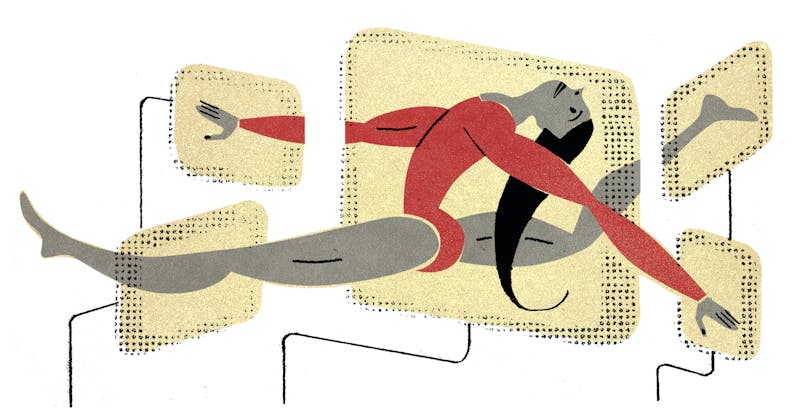When Olympic gold medalist McKayla Maroney decided to announce her retirement from gymnastics in February, she didn’t talk to the Today show, or ESPN, or The New York Times. She picked GymCastic, a weekly podcast run by a 41-year-old law librarian in Orange County named Jessica O’Beirne.
Maroney, best known for her “unimpressed” face while accepting a silver medal for vault at the 2012 Olympic Games in London, was just as open about her true feelings on the podcast. She revealed she’d been afraid to eat in front of her coaches, and was pressured to ignore serious injuries. When she broke her toe on the balance beam after arriving in London, she told O’Beirne, her coaches ordered her to hide it from the press. “Don’t limp; smile, make sure you just look like you’re fine,” they told her. “Because that’s the only way you’re going to stay on this team.”
Launched just after the London Games, O’Beirne’s podcast is part of the “gymternet,” a growing network of blogs and social media streams led by hard-core fans that has upended the way women’s gymnastics is covered. “We wanted gymnastics to be treated like a normal sport,” O’Beirne explained on her show. “To get the same press coverage all year long, every year, that the NFL, the basketball, the hockey, all those sports get.”
This summer, with the nearly unbeatable U.S. women’s team expected to bring home the gold in Rio de Janeiro, the gymternet will serve as an antidote to the inane and sometimes sexist coverage provided by mainstream broadcasters. For serious fans, the worst offender is NBC. When a gymnast was injured right before the 2008 Olympics, for example, NBC commentator Al Trautwig said, “It’s like having a tear in your wedding dress right before you walk down the aisle.” At the 2012 Games, he described Russian gymnasts as “divas” who are “temperamental” and exhibit “petulance to criticism.”
The gymternet, by contrast, focuses more on athleticism than on the tears of teenage girls. One of the most popular sites, The Gymternet, is run by Lauren Hopkins, a 30-year-old fan who works in marketing at a New York law firm. Barely two years old, the site breaks news and provides injury reports, live blogs and analysis of competitions, interviews with elite gymnasts, and critiques of leotard fashion. Hopkins does both serious and silly, writing on everything from international politics (a 2012 decision by the sport’s governing body to devalue the Amanar vault was considered to be “specifically targeting the Americans”) to why pigtails became popular at the 1972 Olympics (“This was the exact moment that the age of gymnasts in the sport shifted from women to young girls, so it was out with the old debutante updos and in with the charming youths!”).

Initially, some of The Gymternet’s best sources were the parents of gymnasts. “Almost immediately, I’d get parents emailing me little tidbits” of news, Hopkins says. Now her followers include the biggest names in the sport, as well as the professional journalists who cover it for a living. At the American Cup in March, half the screens in the media pen were open to The Gymternet’s live blog. First they ignore you, then they read you, then they hire you: Hopkins announced on Twitter this month that she’ll be a gymnastics researcher for NBC’s digital broadcast team for the upcoming Olympic Games in Rio.
“The gymternet has an outsized influence, because there’s not a million places covering everything,” explains Reeves Wiedeman, who recently profiled three-time world champion Simone Biles for The New Yorker. “It’s only a handful of outlets, but they cover it so in-depth.”
If The Gymternet is The New York Times of the gymnastics world, GymCastic functions a bit like Meet the Press: Top athletes and coaches sit for interviews, and a panel of informed fans provides analysis. Guests have included Biles and her coach Aimee Boorman, Olympic gold medalist Shannon Miller, world champion Bridget Sloan, and Soviet legend Svetlana Boginskaya. On the night Biles won her third national championship last year, one of Boorman’s first stops was GymCastic—together, they podcasted until 3 a.m. and ate an entire bag of Twizzlers.
When O’Beirne launched GymCastic in 2012, she took the fight directly to the enemy. Her very first guest was NBC commentator Tim Daggett, who was well aware that his network is unpopular among gymnastics junkies. “When you see a broadcast on television,” Daggett confessed, “it’s not being put together for a group like you guys. … NBC is a huge corporation, and it’s a business, and they’re trying to make money.” The way to do that, he said, is to pick “the most dramatic stories out there” and tell them over and over again, “because it’s what the casual viewer wants.”
O’Beirne sees a paternalistic double standard in the way female athletes like Maroney are told to hide their injuries and smile for the cameras. “A man that’s competing, or a teenage boy who’s competing with an injury is a hero,” she says. “He’s being a man, and he’s stepping up.” But a female gymnast, she says, doesn’t feel she can tell reporters, “Fuck you! My foot hurts. I’m going to do whatever gets me through the competition. If I have to limp or crawl my way back to the hotel room, that’s what I’m going to do.”
In Rio this summer, Simone Biles will dazzle the world, doing the hardest flips with ease, with a shot at five gold medals. She even has her own signature move: The “Biles” is a double backflip, her body stretched out straight like a pencil, with a half twist on the second flip. Serious fans already know that she’s as electrifying as LeBron James, and as far ahead of her competition as Usain Bolt. Now, thanks to the gymternet, Biles and other female gymnasts are finally getting the recognition and respect they deserve. It’s time for the rest of the media to catch up.
